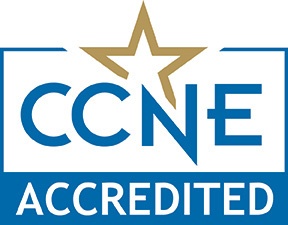
Bachelor of Science in Nursing Program receives five-year accreditation

BSN program at BGSU will welcome its first cohort this fall
By Bob Cunningham '18
The baccalaureate degree program in nursing at Bowling Green State University is accredited by the Commission on Collegiate Nursing Education (CCNE).
The Bachelor of Science in Nursing Program (BSN) is housed within the College of Health and Human Services’ School of Nursing.
“This is a distinguished honor and represents the dedication of Bowling Green State University’s faculty and staff to promote student success in nursing,” said Dr. Shelly Bussard, director of the School of Nursing.
Nursing programs that receive national accreditation from CCNE adhere to common standards of quality set by CCNE, a U.S. Department of Education approved agency.
“One of the first questions prospective students ask is, ‘Are you accredited?’” Bussard said. “They know that if they wish to pursue a master's degree, they need a bachelor’s degree from an accredited school. Now, we can say yes. Graduates of accredited programs also will be highly sought out by employers because they know the nurses have met the highest academic standards. Our program is going to appeal to a lot more students.”
The median pay for a registered nurse with a bachelor's degree is $75,330 per year , according to the U.S. Bureau of Labor Statistics.
The BSN program at BGSU will welcome its first cohort of nursing students, the Class of 2023, and another estimated 100 pre-nursing students who will begin their nursing education this fall.
From a historical perspective, BGSU had a pre-nursing program for 50 years that sent students to the Medical College of Ohio, which then merged with the University of Toledo, for their nursing training.
“This accreditation validates the trust that the Board of Trustees, President (Rodney) Rogers and Dean (James) Ciesla placed in us,” Bussard said. I think there's pure excitement from all areas of the University for the growth of health care, and it certainly meets the University’s mission of doing public good by educating nurses for Ohio and the nation.”
The newly renovated Central Hall is home to the School of Nursing.
Classrooms are on the first floor, where students will learn the concepts of nursing in a traditional classroom setting. The second floor is home to the Simulation Center, which has five highly computerized manikins: a newborn, a child, an adult, a birthing mother and a geriatric manikin. The simulation rooms mimic a hospital environment and provide students with realistic, patient-care scenarios to help them gain clinical judgment skills. The third floor contains a 19-bed skills lab space, where students learn to care for patients and develop psychomotor skills.
The BSN program was conditionally approved by the Ohio Board of Nursing on March 17.
CCNE is an autonomous accrediting agency, contributing to the improvement of the public's health. The commission ensures the quality and integrity of baccalaureate, graduate and residency programs in nursing. It serves the public interest by assessing and identifying programs that engage in effective educational practices. As a voluntary, self-regulatory process, CCNE accreditation supports and encourages continuing self-assessment by nursing programs and supports continuing growth and improvement of collegiate professional education and nurse residency programs.
CCNE accreditation is a nongovernmental peer review process that operates in accordance with nationally recognized standards established for the practice of accreditation in the United States. Accreditation by CCNE is intended to accomplish at least five general purposes:
- To hold nursing programs accountable to the community of interest — the nursing profession, consumers, employers, higher education, students and their families and nurse residents — and to one another by ensuring that these programs have mission statements, goals and outcomes that are appropriate to prepare individuals to fulfill their expected roles.
- To evaluate the success of a nursing program in achieving its mission, goals, and expected outcomes.
- To assess the extent to which a nursing program meets accreditation standards.
- To inform the public of the purposes and values of accreditation and to identify nursing programs that meet accreditation standards.
- To foster continuing improvement in nursing programs — and, thereby, in professional practice.
Source: https://www.aacnnursing.org/CCNE-Accreditation/Who-We-Are
Media Contact | Michael Bratton | mbratto@bgsu.edu | 419-372-6349
Updated: 06/23/2021 12:23PM
